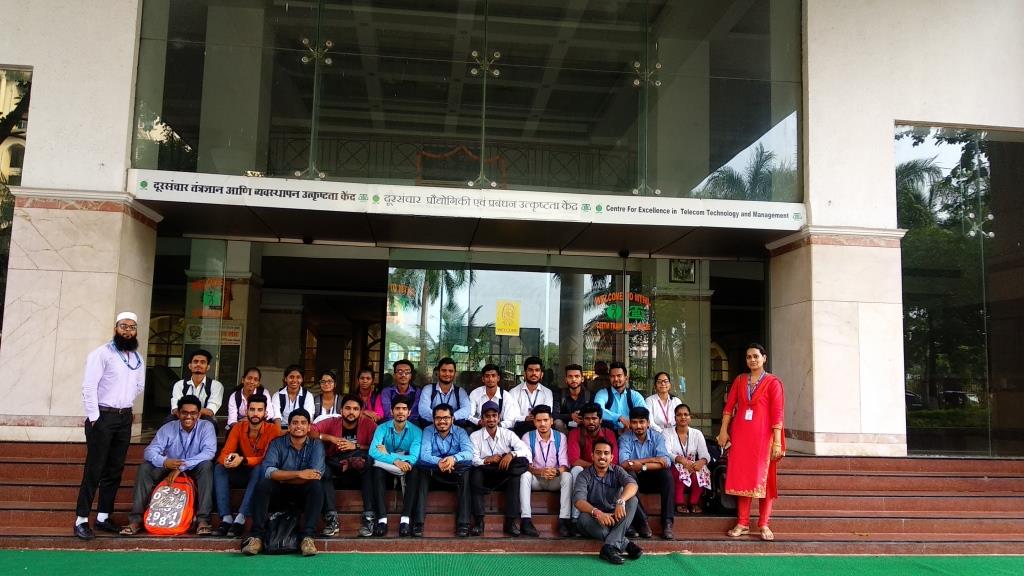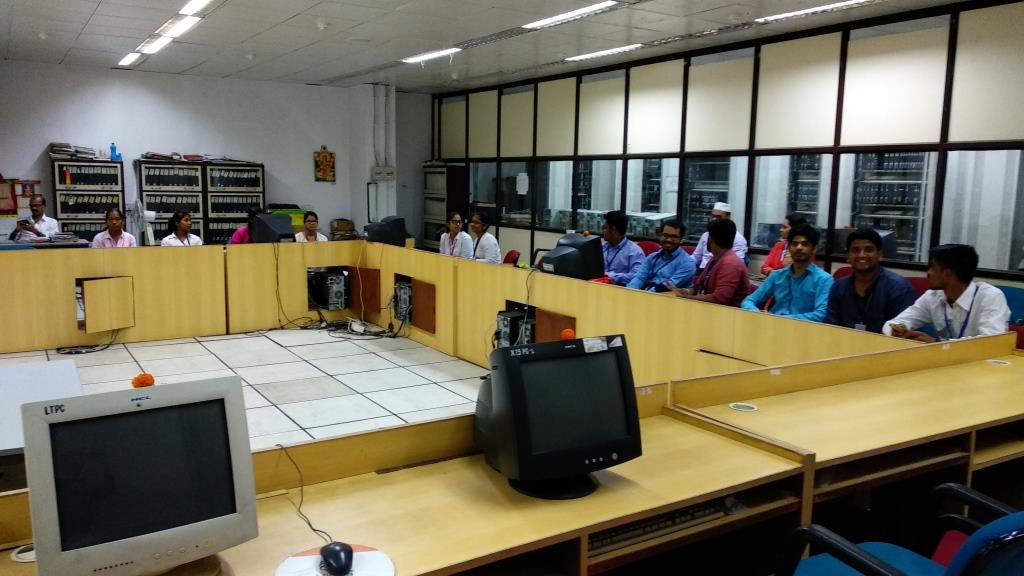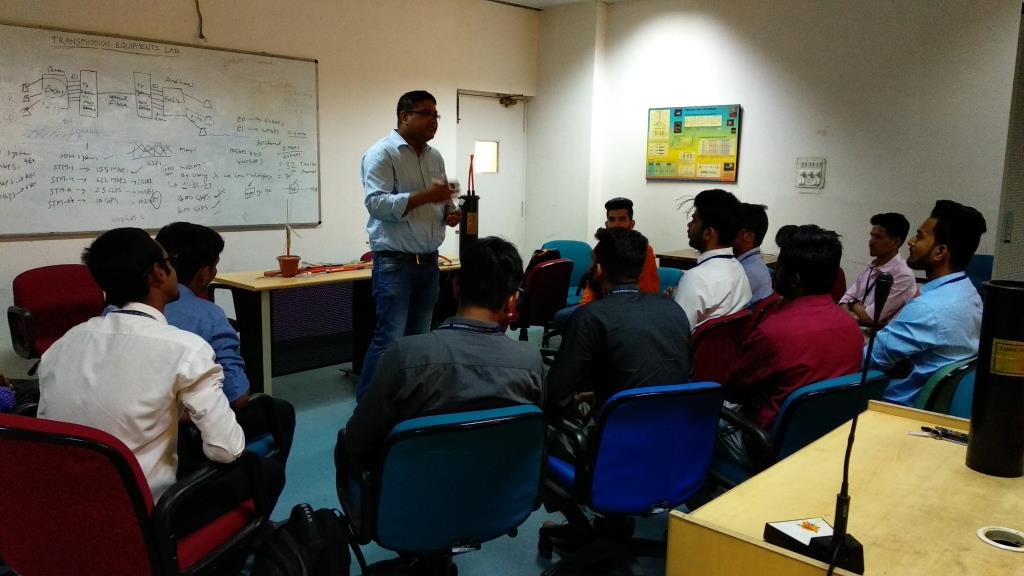| Sem 3 | Applied Mathematics III | Students will able to apply the Set theory and Relation concepts. |
Students will able to apply the Functions and define the recursive functions. |
Students will able to apply Laplace transform to different applications. |
Students will able to apply Inverse Laplace transform to different applications. |
Students will able to Identify the permutations and combinations. |
Students will able to define variable and also identify the mapping.
|
|
|
|
Logic Design | Students will able to understand the concepts of various components to design stable analog circuits. |
Students will able to represent numbers and perform arithmetic operations. |
Students will able to minimize the Boolean expression using Boolean algebra and design it using logic gates |
Students will able to analyze and design combinational circuit. |
Students will able to design and develop sequential circuits |
Students will able to translate real world problems into digital logic formulations using VHDL.
|
|
|
|
Data Structures & Analysis | Students will be able to select appropriate data structures as applied to specified problem definition. |
Students will be able to implement operations like searching, insertion, and deletion, traversing mechanism etc. on various data structures. |
Students will be able to students will be able to implement Linear and Non-Linear data structures. |
Students will be able to implement appropriate sorting/searching technique for given problem. |
Students will be able to design advance data structure using Non-Linear data structure. |
Students will be able to determine and analyze the complexity of given Algorithms. |
|
|
|
Database Management System | Student should be able to explain the features of database management systems and Relational database |
Student should be able to design conceptual models of a database using ER modeling for real life applications and also construct queries in Relational Algebra |
Student should be able to create and populate a RDBMS for a real life application, with constraints and keys, using SQL. |
Student should be able to retrieve any type of information from a data base by formulating complex queries in SQL. |
Student should be able to analyze the existing design of a database schema and apply concepts of normalization to design an optimal database. |
Student should be able to build indexing mechanisms for efficient retrieval of information from a database |
|
|
|
Principle of Communications | Students will be able to differentiate analog and digital communication systems |
Students will be able to identify different types of noise occurred, its minimization and able to apply Fourier analysis in frequency & time domain to quantify bandwidth requirement of variety of analog and digital communication systems. |
Students will be able to design generation & detection AM, DSB, SSB, FM transmitter and receiver. |
Students will be able to apply sampling theorem to quantify the fundamental relationship between channel bandwidth, digital symbol rate and bit rate |
Students will be able to explain different types of line coding techniques for generation and detection of signals. |
Students will be able to describe Electromagnetic Radiation and propagation of waves.
|
|
|
|
| Sem 4 | Applied Mathematics-IV | Students will able to apply the Number Theory to different applications using theorem. |
Students will able to apply probability and understand PDF. |
Students will able to understand sampling theory and correlation. |
Students will able to apply the graphs and trees concepts to different applications. |
Students will able to understand group?s theory. |
Students will able to understand the Lattice theory |
|
|
|
Computer Networks | Students will be able to describe the functions of each layer in OSI and TCP/IP model. |
Students will be able to explain the functions of Application layer and Presentation layer paradigms and Protocols. |
Students will able to describe the Session layer design issues and Transport layer services. |
Students will able to classify the routing protocols and analyze how to assign the IP addresses for the given network. |
Students will able to describe the functions of data link layer and explain the protocols.
|
Students will able to explain the types of transmission media with real time applications. |
|
|
|
Operating Systems | Student should be able to describe the important computer system resources and the role of operating system in their management policies and algorithms. |
Student should be able to understand the process management policies and scheduling of processes by CPU |
Students will be able to evaluate the requirement for process synchronization and coordination handled by operating system |
Student should be able to describe and analyze the memory management and its allocation policies. |
Student should be able to identify use and evaluate the storage management policies with respect to different storage management technologies. |
Student should be able to identify the need to create the special purpose operating system.
|
|
|
|
Computer Organization and Architecture | Students will be able to describe basic organization of computer and the architecture of 8086 microprocessor. |
Students will be able to implement assembly language program for given task for 8086 microprocessor. |
Students will be able to demonstrate control unit operations and conceptualize instruction level parallelism. |
Students will be able to demonstrate and perform computer arithmetic operations on integer and real numbers. |
Students will be able to categorize memory organization and explain the function of each element of a memory hierarchy. |
Students will be able to identify and compare different methods for computer I/O mechanisms. |
|
|
|
Automata Theory | Students will be able to understand, design, construct, analyze and interpret Regular languages, Expression and Grammars. |
Students will be able to design different types of Finite Automata and Machines as Acceptor, Verifier and Translator. |
Students will be able to understand, design, analyze and interpret Context Free languages, Expression and Grammars. |
Students will be able to design different types of Push down Automata as Simple Parser. |
Students will be able to design different types of Turing Machines as Acceptor, Verifier, Translator and Basic computing machine. |
Students will be able to compare, understand and analyze different languages, grammars, Automata and Machines and appreciate their power and convert Automata to Programs and Functions |
|
|
|
| Sem 5 | Computer Graphics and Virtual Reality | Students shall have understood basic concepts of computer graphics. |
Students shall have understood algorithms to scan convert the basic geometrical primitives, transformations, Area filling, clipping. |
Students shall have understood the fundamentals of animation, Virtual reality ,the related technologies, and shall be able to describe applications of Virtual Reality. |
|
|
|
|
|
|
Operating Systems | Student will learn important computer system resources and their management policies, algorithms used by operating systems. |
Student will understand what makes a computer system function and the primary PC components. |
Student will understand the working of an OS as a manager of various resources. |
Student will implement some of the functions of OS such as scheduling policies, page replacement algorithms, IPC. |
|
|
|
|
|
Microcontroller and Embedded Systems | Ability to understand basic structure embedded systems |
Ability to understand basic structure microcontroller. |
Ability to understand basic concepts used in embedded system. |
Ability to program microcontroller. |
Ability to design conceptual embedded system. |
|
|
|
|
Advanced Database Management Systems | Construct complex queries using SQL to retrieve and manipulate information in a database. |
Design and implement full-fledged real life applications integrated with database systems. |
Clearly understand how databases are actually stored and accessed; How transaction ACID properties are maintained and how a database recovers from failures. |
Apply security controls to avoid any type of security incidents on vital database systems. |
Design advanced data systems using Object based systems or Distributing databases for better resource management. |
Understand the importance of enterprise data and be able to organize data to perform analysis on the data and take strategic decisions. |
|
|
|
Open Source Technologies | After this course students will be able to apply knowledge of the linux shell commands for working on the linux environment. |
After this course students will be able to apply knowledge of the linux administration commands for performing network and system security administration. |
After this course students will be able to apply knowledge of servers to configure various servers like FTP, Web server, DNS, etc. |
After this course students will be able to create simple apps for the Android OS.
|
|
|
|
|
|
Business Communication and Ethics | A learner will be able to communicate effectively in both verbal and written form and demonstrate knowledge of professional and ethical responsibilities |
A learner will be able to participate and succeed in Campus placements and competitive examinations like GATE, CET. |
A learner will be able to possess entrepreneurial approach and ability for life-long learning. |
A learner will be able to have education necessary for understanding the impact of engineering solutions on Society and demonstrate awareness of contemporary issues.
|
|
|
|
|
|
| Sem 6 | Software Engineering | Meet the Information Technology Program Objectives of identifying and solving engineering problems |
To understand principles, concepts, methods, and techniques of the software engineering approach to producing quality software for large, complex systems. |
To function effectively as a member of a team engaged in technical work. |
To think critically about ethical and social issues in software engineering for different applications |
|
|
|
|
|
Distributed Systems | The student gains clear understanding of fundamental principles of Distributed Systems along with design and implementation of key mechanisms, Clock Synchronization, Election Algorithms, Mutual Exclusion, Message Communication, Process and Resource Scheduling etc. |
The student understands the message communication, remote procedure call and Remote method invocation (RPC and RMI) along with group communication. |
Emphasis is on developing applications using current distributed computing technologies like EJB, CORBA and .NET. |
Student should be able to develop/design distributed system/applications for an enterprise using SOA |
|
|
|
|
|
System And Web Security | Upon successful completion of the course the student will be able to differentiate between authentication and authorization |
Upon successful completion of the course the student will be able to explain the basic idea behind access control and compare the various access control policies and models. |
Upon successful completion of the course the student will be able to explain the need for security protocols in the context of use with Internetbased applications |
Upon successful completion of the course the student will be able to explain the basic idea behind firewalls and intrusion detection systems and how they work |
Upon successful completion of the course the student will be able to explain malicious software and typical software solutions used in dealing with viruses and worms |
Upon successful completion of the course the student will be able to understand and explain various issues related to program security and web security. |
|
|
|
Data Mining and Business Intelligence | On successful completion of this course students should be able demonstrate an understanding of the importance of data mining and the principles of business intelligence |
On successful completion of this course students should be able able to prepare the data needed for data mining algorithms in terms of attributes and class inputs, training, validating, and testing files. |
On successful completion of this course students should be able implement the appropriate data mining methods like classification, clustering or association mining on large data sets. |
On successful completion of this course students should be able define and apply metrics to measure the performance of various data mining algorithms. |
On successful completion of this course students should be able apply BI to solve practical problems : Analyze the problem domain, use the data collected in enterprise apply the appropriate data mining technique, interpret and visualize the results and provide decision support. |
|
|
|
|
Advanced Internet Technology | On successful completion of this course students should be able develop Keyword Generation, Using Google Analytics etc. |
On successful completion of this course students should be able to demonstrate Responsive Web Design |
On successful completion of this course students should be able to demonstrate Amazon/Google or yahoo mashup. |
|
|
|
|
|
|
| Sem 7 | Software Project Management | Upon completion of the course, students should be able to articulate similarities and differences between IT projects and other types of projects. |
Upon completion of the course, students should be able to justify an IT project by establishing a business case |
Upon completion of the course, students should be able to develop a project charter |
Upon completion of the course, students should be able to develop a work breakdown structure for an IT project Estimate resources (time, cost, human being, etc.) |
Upon completion of the course, students should be able to establish task inter-dependencies |
Upon completion of the course, students should be able to construct and analyze a network diagram |
Upon completion of the course, students should be able to identify IT project risks and develop risk mitigation strategies |
Upon completion of the course, students should be able to ensure the quality of the project using various standards |
Upon completion of the course, students should be able to demonstrate Team work and team spirit and how to overcome the conflicts |
Cloud Computing | After completion of the course the learner should be able to differentiate different computing techniques. |
After completion of the course the learner should be able to compare various cloud computing providers/ Software. |
After completion of the course the learner should be able to handle Open Source Cloud Implementation and Administration. |
After completion of the course the learner should be able to understand risks involved in cloud computing. |
|
|
|
|
|
Intelligent System | Students will develop a basic understanding of the building blocks of AI as presented in terms of intelligent agents. |
Students will be able to choose an appropriate problem-solving method and knowledge-representation scheme. |
Students will develop an ability to analyze and formalize the problem (as a state space, graph, etc.) and select the appropriate search method. |
Students will be able to develop/demonstrate/ build simple intelligent systems or classical toy problems using different AI techniques. |
|
|
|
|
|
Wireless Technology | Understand the new trends in mobile/wireless communications networks |
Understand the characteristics of mobile/wireless communication channels |
Understand the multiple radio access techniques |
Understand the multiuser detection techniques |
|
|
|
|
|
E- Commerce and EBusiness | |
|
|
|
|
|
|
|
|
Project I | The learner should be able to prepare a synopsis of the work selected. |
|
|
|
|
|
|
|
|
| Sem 8 | Storage Network Management and Retrieval | Students will be able to evaluate storage architectures, including storage subsystems, SAN, NAS, and IP-SAN, also define backup, recovery. |
Examine emerging technologies including IP-SAN. |
Define information retrieval in storage network and identify different storage virtualization technologies. |
|
|
|
|
|
|
Big Data Analytics | At the end of this course a student will be able to understand the key issues in big data management and its associated applications in intelligent business and scientific computing. |
At the end of this course a student will be able to acquire fundamental enabling techniques and scalable algorithms like Hadoop, Map Reduce and NO SQL in big data analytics. |
At the end of this course a student will be able to interpret business models and scientific computing paradigms, and apply software tools for big data analytics. |
At the end of this course a student will be able to achieve adequate perspectives of big data analytics in various applications like recommender systems, social media applications etc. |
|
|
|
|
|
Computer Simulation and Modeling | Understand the meaning of simulation and its importance in business, science, engineering, industry and services |
Identify the common applications of discrete-event system simulation. Practice formulation and modeling skills. |
Understand simulation languages Ability to analyze events and inter-arrival time, arrival process, queuing strategies, resources and disposal of entities |
An ability to perform a simulation using spreadsheets as well as simulation language/package |
Ability to generate pseudorandom numbers using the Linear Congruential Method |
Ability to perform statistical tests to measure the quality of a pseudorandom number generator |
Ability to define random variate generators for finite random variables |
Ability to analyze and fit the collected data to different distributions |
|
Software Testing & Quality Assurance | |
|
|
|
|
|
|
|
|
Project II | The learner should be able to demonstrate the product that is implemented. |
The learner should be able to produce the proper documentation of the work |
The learner should be able to able to work in team and communicate with peers. |
The learner should be able to develop skills required by the industry
|
|
|
|
|
|
























